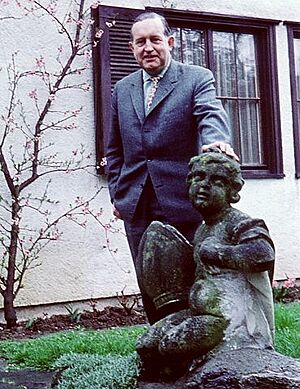Norbert Schultze facts for kids

Norbert Arnold Wilhelm Richard Schultze (born January 26, 1911, died October 14, 2002) was a German composer. He wrote music for many films and stage shows. He is most famous for creating the melody of the well-known World War II song "Lili Marleen". This song started as a poem by Hans Leip from his 1915 book Die kleine Hafenorgel.
Norbert Schultze also wrote operas like Schwarzer Peter and Das kalte Herz. He composed the musical Käpt'n Bye-Bye, which included the popular song "Nimm' mich mit, Kapitän, auf die Reise" ("Take me travelling, Captain"). He also wrote music for many movies, such as The Immenhof Girls (1955). Sometimes, he used other names like Frank Norbert, Peter Kornfeld, and Henri Iversen for his work.
Contents
Early Life and Career
Norbert Schultze grew up in Brunswick. After finishing school, he studied music in Cologne and Munich. He learned to play the piano, conduct music, compose, and study theater. In the 1930s, he moved to Munich. There, he worked as an actor in a student comedy group called "Die Vier Nachrichter" (The Four Reporters), using the name Frank Norbert. From 1932 to 1934, he worked as a conductor in several cities, including Heidelberg, Darmstadt, Munich, Leipzig, and Mannheim.
During World War II
After working as a production manager at Telefunken, Schultze decided in 1936 to become a full-time composer for plays and movies. He wrote many songs that encouraged fighting and supported the government's ideas, known as propaganda songs. In 1940, he joined the National Socialist German Workers Party (the Nazi Party). This helped him avoid being forced to join the army.
Norbert Schultze married his first wife, Vera Spohr, in 1932. They had four children together. After they divorced in 1943, he married Iwa Wanja, an actress, singer, and writer from Bulgaria. She helped write the stories for some of his stage shows. They had two sons.
During the war, the government's Minister of Propaganda, Joseph Goebbels, asked Schultze to create more music. He wrote songs like "From Finland to the Black Sea," "The song of the Kleist tank group," "Tanks roll in Africa," and "Bombs on England." These songs were very popular and kept him busy writing for the government's messages. He also wrote music for the movie Kolberg, which was made to encourage people to keep fighting. He also composed the main music for the war documentary Baptism of Fire (Feuertaufe).
After the war, a process called denazification took place. This process aimed to remove people who supported the Nazi government from important positions. Schultze was identified as a "fellow traveller," meaning he had supported the government. He paid a fee and was allowed to continue working right away. He made sure that all the money he earned from his songs between 1933 and 1945 went to the German Red Cross. This continues to this day.
Because of his song "Bomben auf Engeland" ("Bombs on England"), some people in Germany called him "Bomben-Schultze." He later said that he was very young and naive when he wrote that song. He worried if his music might lead to harm for his own family or friends.
The Story of Lili Marleen
Norbert Schultze wrote the famous melody for "Lili Marleen." The words came from a poem by Hans Leip. In 1990, Schultze shared that he originally wrote the tune for a toothpaste radio advertisement!
The first recordings of the song, sung by Lale Andersen in 1939, did not sell well at first. However, a German military radio station in Belgrade started playing the song often at the end of its broadcasts. Soon, listeners began sending many letters asking for the song. "Lili Marleen" became very popular with soldiers from all sides of the war. It was translated into about fifty languages. The song captured the feelings of millions of soldiers and became a symbol of World War II. It was the first German song to sell over a million copies.
After the War
Norbert Schultze continued his career as a composer after the war. He wrote many operas, operettas (like Rain in Paris), musicals, and ballets. Some of his ballets included Struwwelpeter (written before the war) and Max and Moritz (which was made into a movie in 1956). He also composed music for more than 50 movies and many other songs.
From 1961, he was the president of the Association of German stage writers and composers. He also served on the board of the German Composer Association from 1973 to 1991. Until 1996, he held positions on the board of GEMA (Germany), which is a German organization that collects money for musicians when their music is used. Later in his life, he spent most of his time in Majorca and Bavaria with his third wife, Brigitt Salvatori, whom he married in 1992.
Music for Movies
Here are some of the movies Norbert Schultze composed music for:
- Renate in the Quartet (1939)
- The Roedern Affair (1944)
- Night of the Twelve (1949)
- Twelve Hearts for Charly (1949)
- A Day Will Come (1950)
- The Day Before the Wedding (1952)
- Captain Bay-Bay (1953)
- The Dancing Heart (1953)
- Beloved Life (1953)
- Captain Wronski (1954)
- A Life for Do (1954)
- Mamitschka (1955)
- The Immenhof Girls (1955)
- Like Once Lili Marleen (1956)
 | John T. Biggers |
 | Thomas Blackshear |
 | Mark Bradford |
 | Beverly Buchanan |

